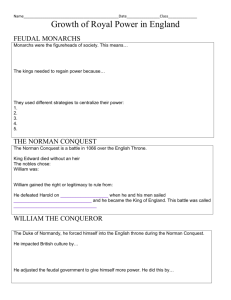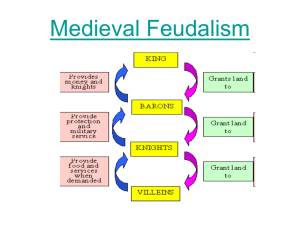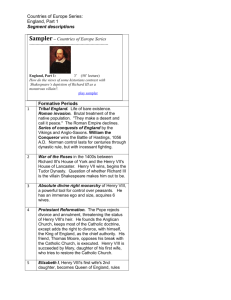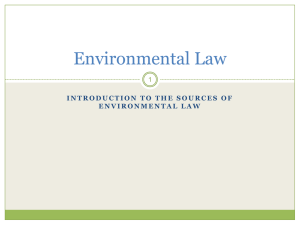Henry II and Common Law
advertisement
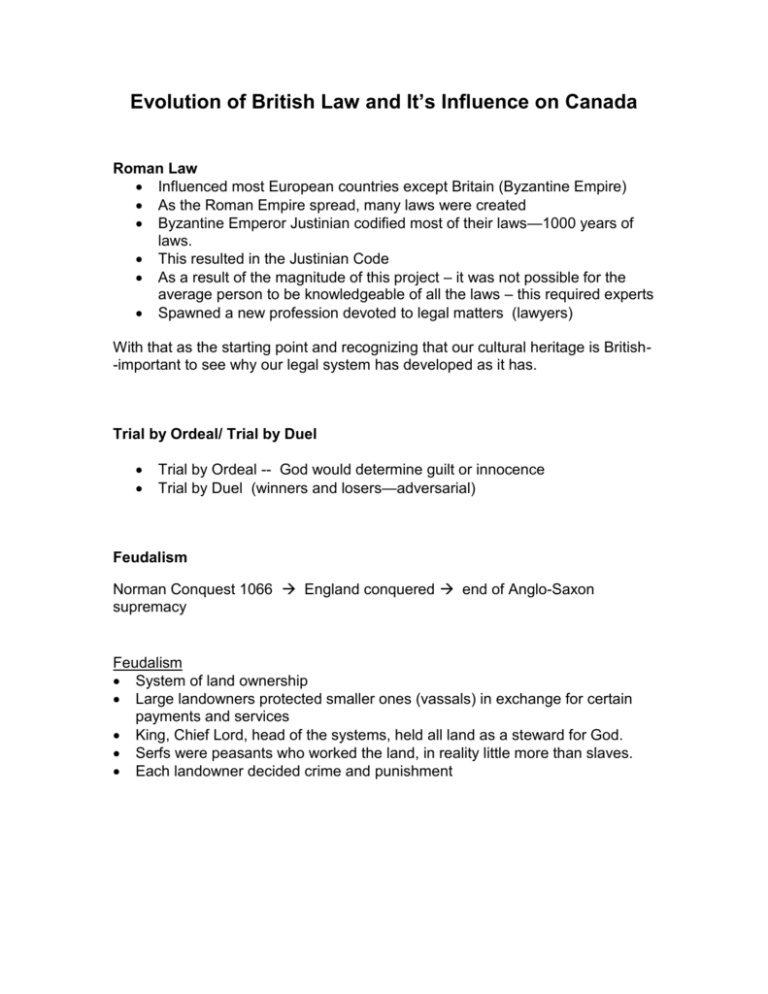
Evolution of British Law and It’s Influence on Canada Roman Law Influenced most European countries except Britain (Byzantine Empire) As the Roman Empire spread, many laws were created Byzantine Emperor Justinian codified most of their laws—1000 years of laws. This resulted in the Justinian Code As a result of the magnitude of this project – it was not possible for the average person to be knowledgeable of all the laws – this required experts Spawned a new profession devoted to legal matters (lawyers) With that as the starting point and recognizing that our cultural heritage is British-important to see why our legal system has developed as it has. Trial by Ordeal/ Trial by Duel Trial by Ordeal -- God would determine guilt or innocence Trial by Duel (winners and losers—adversarial) Feudalism Norman Conquest 1066 England conquered end of Anglo-Saxon supremacy Feudalism System of land ownership Large landowners protected smaller ones (vassals) in exchange for certain payments and services King, Chief Lord, head of the systems, held all land as a steward for God. Serfs were peasants who worked the land, in reality little more than slaves. Each landowner decided crime and punishment Henry I Interested in law as a tool for re-establishing and entrenching the power of the monarch. Reign important to beginning of English law and its administration. Beginning of common law Beginning of King’s Courts In Henry’s time 5 competing laws: Anglo-Saxon customary law Norman feudal law Church law jurisdiction over clerics and working people (wills and family disputes) English business law (developing stages) Roman civil law (being studied because of its glorification of the king’s role) Therefore, Henry I laid the foundation of Common Law 1. Law common to the entire kingdom 2. Law not for a single class but for all Englishmen Henry would direct sheriffs and members of Curia Regis to try special cases in local courts. Travelling justices would go into more than 1 shire and give similar judgements in similar cases. ESTABLISHED UNIFORMITY IN DECISION AND PROCEDURES KING’S COURTS (specialized services) 1. Treasury Department to audit semi-annual collection of King’s revenues 1. Became Court of Exchequer (Edward I) 1. Developed to administer financial concerns of kingdom 2. Settle tax assessment disputes 2. Court of Common Pleas 1. Resolve disputes between king’s subjects (did not involve the king) 3. Court of King’s Bench Two functions: Final court of appeal Trial court for criminal cases King’s Courts more efficient and fair -- Baron's Courts eventually phased out. Henry II and Common Law Henry II improved procedures gave people increased sense of security. regularly sent travelling justices to the shires justices would settle disputes based upon existing law or custom If existing custom did not exist new law created to resolve the matter. Decision would become law without legislation Judges return to London discuss decisions/cases group decides best way to resolve specific issues. 1. Led to a COMMON LAW for all England 2. Developed through experience and practical wisdom of judges. Precedent earlier decisions used to settle current disputes fair and uniform system of judging offences Rule of Precedent (Stare Decisis) Trial by Jury Henry II established grand assizes and petty assizes 1. 2. 3. 4. Grand Assizes--general disputes over land holdings Petty Assizes--specific disputes over land holdings. Each had 12 local men did not render a verdict** TASK: inform judge by telling the judge - under oath - about the land in question. 5. As trial by ordeal was diminished as a method of proof criminal defendants were permitted to accept the judgment of 12 local men selected by the judges and sitting as a petty assize. King John (1199 - 1216) Power struggle between monarchy, nobility, and the Church King John placed more restrictions on all classes of society June 15, 1215 Battle of Runnymede Barons united with clergy and free men of the town Forced King John to sign MAGNA CARTA (Great Charter) Magna Charter Cornerstone of English democracy and basis of our civil liberties. Concerns: 1. King to respect existing rights of barons, clergy and free men of the towns. 2. Formulated principles respecting administration of justice. Bound king and followers to them as well 3. No man would be forced to stand trial solely on the basis of an accusation evidence/credible witnesses required. 4. No punishment of a free man nor prosecution except by legal judgment by peers or by law of the land. 5. No one will be denied or delayed in the pursuit of justice. Henry III Despite Magna Carta still a power struggle for another 50 years. 1265 Barons forced Henry III to assemble the first PARLIAMENT to represent the people. *Beginning of a long struggle by the English people to establish a working democracy. The English Parliament To create a new law: 1. Parliament presented it to the king -- form of a petition 2. Petition granted Royal Assent -- became law. King could not impose taxes without consent of parliament Parliament would not give consent unless the king passed its laws!!! POWER OF PARLIAMENT IN LAWMAKING. Parliament fully established -- 18th Century parliament totally responsible to the people. Prime Minister appointed by majority in parliament NOT by the king.
